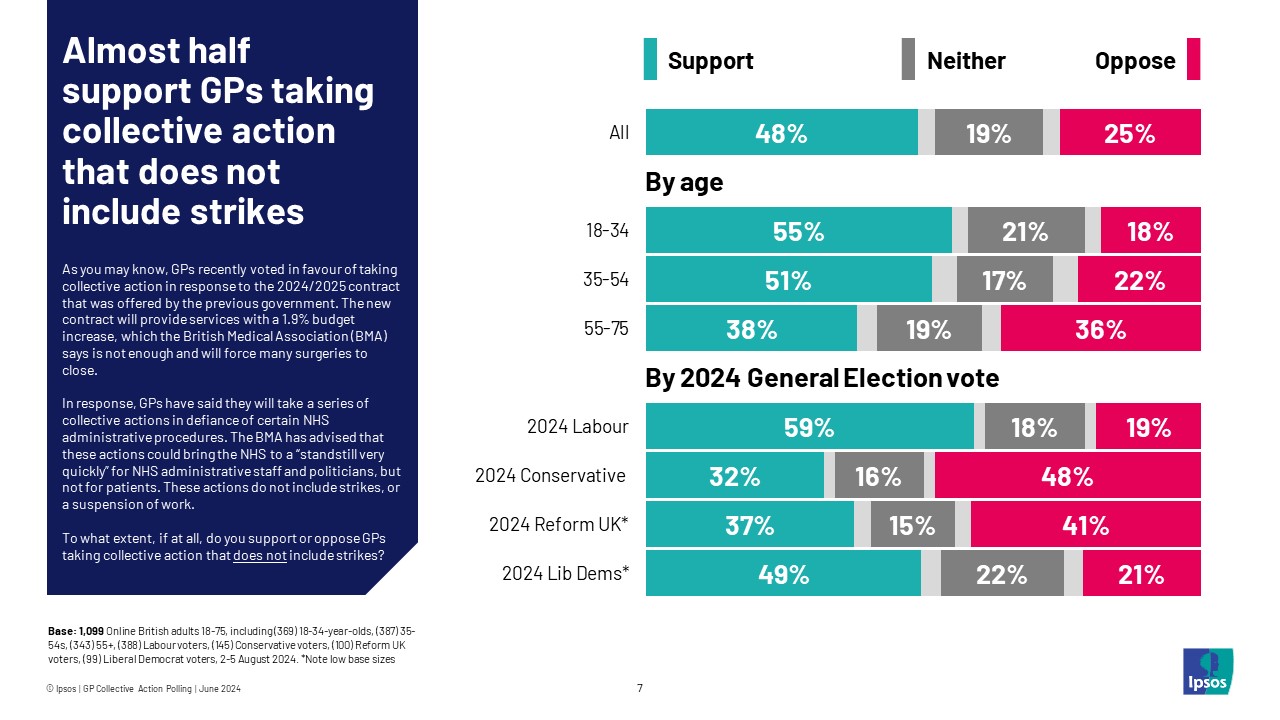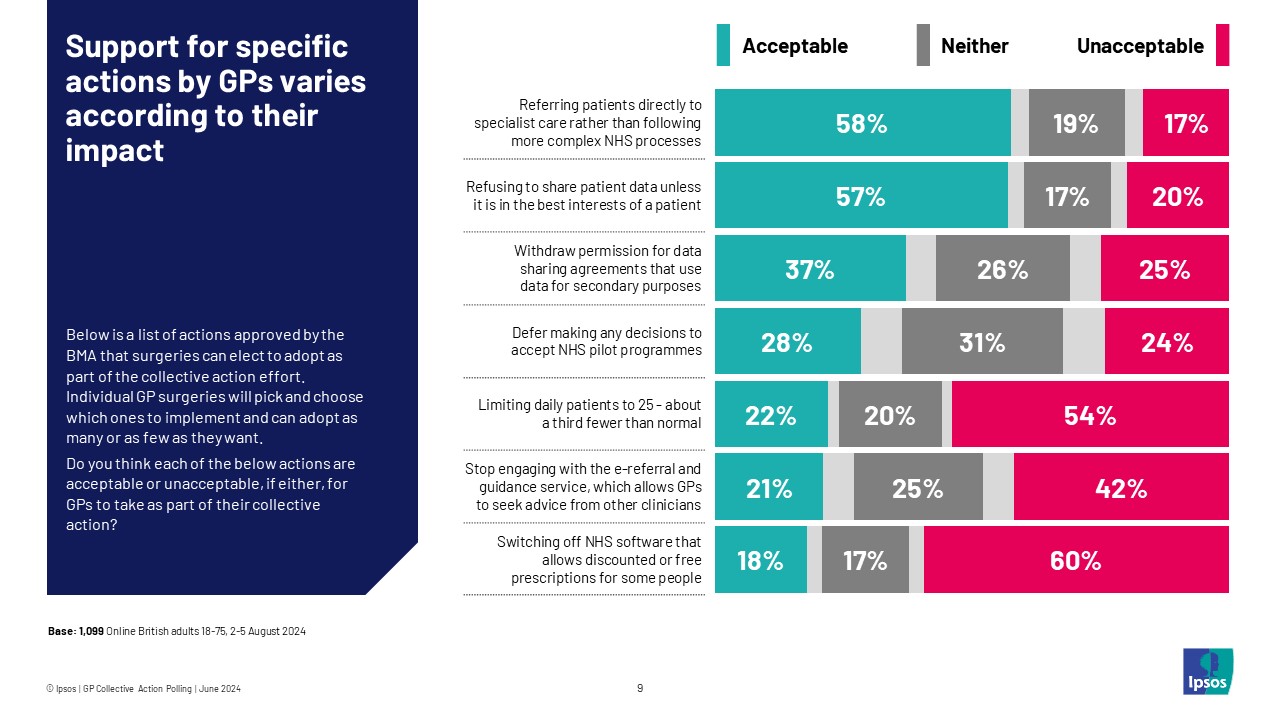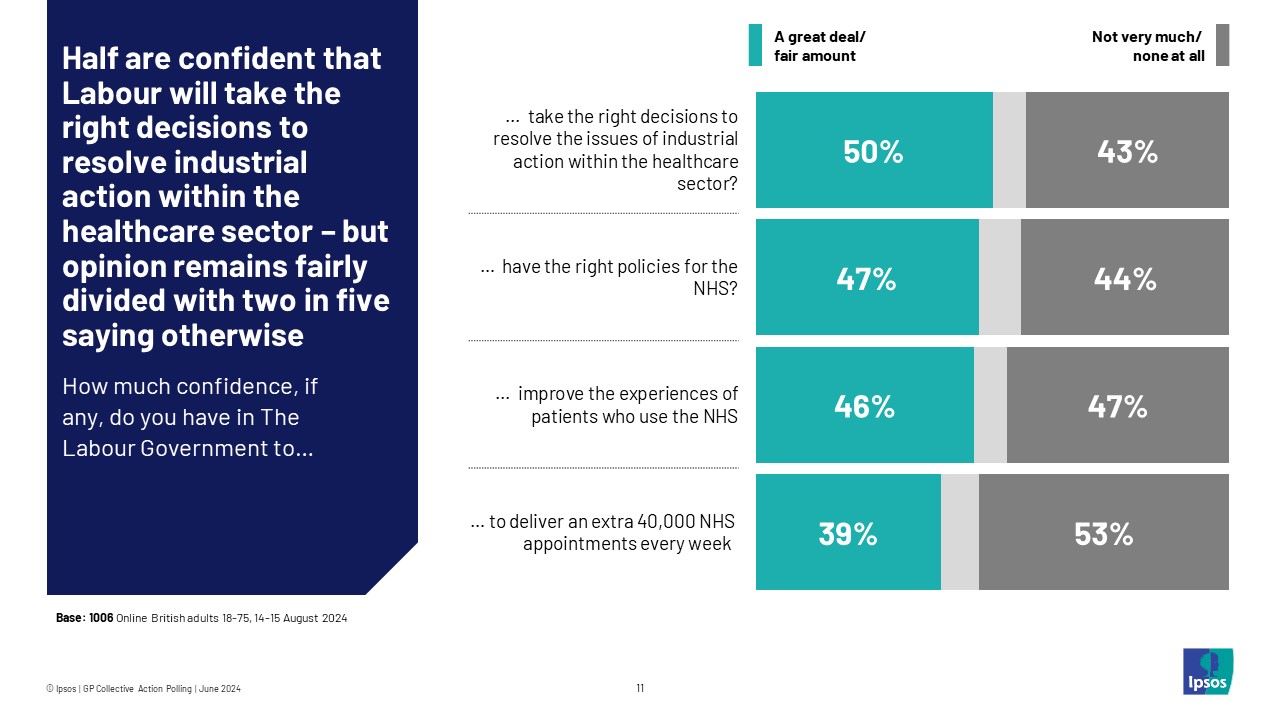Almost half the public support GPs taking collective action short of strikes
- However, support for individual actions varies, and most think it is unacceptable for GPs to limit their daily patients to just 25
- One in three say Labour government doing a good job negotiating with trade unions generally
- Overall perceptions of the NHS in England improve since March, but half still critical over availability of non-urgent GP appointments
New polling by Ipsos examines support for collective action by GPs, which began at the start of the month on the basis that they believe there is insufficient funding in their latest contracts. It also assesses what the public feel about the Labour party’s handling of negotiations with trade unions thus far, and the overall state of the NHS. Data is presented from two surveys, one from 2-5 August and one from 14-15 August.
Opinion towards collective action
Almost half (48%) of Britons are supportive of collective action by GPs that does not include strikes, against one in four who oppose it (25%). Support is highest amongst those aged 18-34 (55%), and 2024 Labour voters (59%).

The public is most sympathetic towards NHS patients during the collective action, with 9 in 10 (91%) saying they have sympathy for them. 6 in 10 (62%) have sympathy for GPs, and 55% have sympathy for the unions representing healthcare workers. However, less than half are sympathetic towards NHS management (42%) or the current Labour government (41%), and only 25% feel much sympathy for the previous Conservative government.
When asked about the various collective actions approved by the BMA that surgeries can elect to adopt, three in five (58%) believe it is acceptable for GP surgeries to refer a patient directly to specialist care, rather than following NHS processes. A similar proportion (57%) believe it is acceptable to refuse to share patient data unless it is in the best interests of the patient.
However, the majority believe it is unacceptable for GPs to limit daily patients to 25 during collective action (54%), and similarly three in five say the same about switching off NHS software that allows discounted or free prescriptions for some people (60%).

The Labour Party’s handling of the NHS and negotiations with trade unions
Elsewhere in the research, one in three (32%) say the UK government, led by Keir Starmer, is doing a good job negotiating with trade unions to prevent disruption to public services generally (and the same proportion think Health and Social Care Secretary Wes Streeting is doing a good job at negotiating with NHS unions specifically), while one in five (23%) think it is doing a bad job. The public is divided as to whether Keir Starmer’s government is doing a better job than the previous government (35%) or whether there is no difference (37%), but only 16% say it is worse. Over a third (37%) think Wes Streeting has been doing a better job at negotiating with NHS trade unions than previous Conservative government.
Half (50%) are confident that Labour will take the right decisions to resolve industrial action within the healthcare sector – but opinion remains fairly divided with two in five (43%) saying otherwise. Half (53%) do not have confidence in the party to deliver on its pledge to create 40,000 NHS appointments per week.

Public Perceptions of the NHS
These findings come amid public pessimism about the state of the National Health Service, with 54% saying that it is heading in the wrong direction. This rises to three in five for those aged 45-75. Only one in five (22%) think the opposite and say the NHS is heading in the right direction.
Despite this, perceptions of the NHS in England are improving, with 57% saying that the quality of NHS services in general is good – up 11 points from March 2024. Even more, 67%, say that the availability of prescription medications is good (up 8 ppts). However, nearly half say that the availability of GP appointments for non-urgent conditions is poor (48%, though this has also improved by 14 ppts since March).
When asked about their personal experiences, 6 in 10 of those in England say that the accessibility of prescription medications they personally take is good (62%, +7ppts since March). Half (53%, up 4) say that the quality of NHS services in general is good, while 39% (+10) say their personal experience of the availability of non-urgent GP appointments is good, but still just as many (41%) are critical.
Commenting on the findings, Kate Duxbury, Ipsos Research Director, Health and Social Care said:
These findings show that public perceptions towards the NHS are experiencing a bit of a honeymoon effect under the new Labour government, but there are still deep-rooted concerns about the direction the NHS is taking – particularly on availability of appointments.
When it comes to industrial action in the NHS, we know from our polling over the last couple of years that the public have tended to support health professionals taking strike action, so it is no surprise that they continue to support GPs taking action that stops short of strikes – although this falls when it directly impacts patients, such as limiting the number GPs see each day. The new government has made some progress already in negotiating with trade unions, and this has been noted to some extent by the public. But it is clear that the public remain supportive and appreciative of those who staff the NHS, while reserving most sympathy of all for patients.
Technical Note
- Data taken from two surveys. Questions on the collective action by GPs are from a representative sample of 1,099 adults aged 18-75 across Great Britain. Polling was conducted online between 2-5 August 2024. For questions on handling of negotiations, sympathy, overall attitudes towards the NHS and Labour’s handling of it were taken from a representative sample of 1,006 adults aged 18-75 across Great Britain (890 in England), conducted online between 14-15 August 2024.
- Data are weighted to match the profile of the population. All polls are subject to a wide range of potential sources of error.


